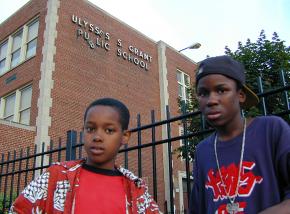The battle to save our schools in Chicago
Chicago teacher reports on a fight to save schools that is uniting teachers, parents and community members.
BUSLOADS OF angry teachers and parents will descend on a Chicago Board of Education meeting January 28 to protest a plan to close or consolidate 16 schools and implement a "turnaround" plan in six others that would fire teachers and staff, and force them to reapply for their jobs.
The closings and mass firings are part of a long-term effort to privatize public education by outgoing Chicago Schools CEO Arne Duncan, who is moving to Washington to become Barack Obama's Education Secretary.
In Chicago, Duncan did the bidding of Mayor Richard Daley. Both Duncan and Daley are proponents of the mindless testing regime to "prove" school results that is at the heart of George W. Bush's misnamed No Child Left Behind law.
Duncan's "Renaissance 2010" program for school "reform" in Chicago has been the main vehicle for gentrification in the Chicago Public Schools (CPS) system and attacks on teachers.
Since Renaissance 2010 started in 2004, private-run charter and "contract" schools have pushed out both teachers and students, outsourcing education in neighborhoods targeted by City Hall for real-estate development.
Duncan has also sanctioned the scorched-earth campaign known as turnaround, in which an entire school staff is fired and replaced. Frequently, these turnarounds have targeted veteran African American teachers, to replace them with younger and lower-paid teachers who are often white.
In the case of charter schools, teachers are barred by law from being covered under the Chicago Teachers Union (CTU) contract, and they don't even need proper teaching credentials.
None of the measures implemented under Renaissance 2010 have shown more than a modest initial gain in test scores--which are, in any case, a highly flawed indicator of actual learning.
To date, there are more than 50 Renaissance schools, which receive corporate funding and are privately operated. At its current growth rate, Renaissance programs could force half of Chicago's teachers out of the union by 2020.
The schools targeted for closure and turnaround are often in poor African American neighborhoods. Of the 400,000 students in the system, 46.5 percent are African American, 39.1 percent Latino and 8 percent white. A 2003 Harvard University study found that racial segregation in Chicago schools is "only a few percentage points from an experience of total apartheid for Black students."
Nevertheless, Duncan requested that U.S. District Judge Charles Kocoras end a 1980 consent decree that compelled CPS to seek to improve racial balance when it creates magnet schools. If Kocoras strikes down the decree, school "reform" efforts would only worsen racial inequality as the district launches magnet schools in gentrifying, mostly white neighborhoods.
DUNCAN'S HIGH-HANDED methods have led to rising anger among teachers, parents and students.
Community groups have spoken out against Duncan's efforts to end the consent decree, and some 500 people attended a three-hour meeting January 10 to launch a fight against the school closures. Teachers, students, parents and community organizations impacted by Renaissance 2010 all gave testimony, and resolved to protest the school board's kangaroo court hearings on the latest planned closure.
Several panelists spoke about the impact of charter schools. Chantelle Allen, a former teacher at the Perspectives Academy charter school, objected to the fact that the school's junior class had no special education teacher. When she complained to the state Board of Education, she was fired--and replaced by a teacher who doesn't have a degree in education.
The January 10 meeting was organized by the Caucus of Rank and File Educators (CORE), formed last year in response to the CTU's paralysis on these issues.
Anticipating another round of Renaissance 2010 closings, turnarounds and charters this year, CORE mobilized teachers, parents and students to confront the board at last December's meeting. Coincidentally, Obama announced Duncan's appointment the day before. Confronting Duncan's flagship "reform" program so fouled the backslapping mood of the board meeting that Duncan had to leave the room for more than an hour.
Among the speakers at the January 10 meeting was CTU President Marilyn Stewart. Although this is the fourth round of closings under Renaissance 2010, the CTU is making a substantial effort to mobilize pickets and protests for the first time.
This may signal a turn away from the "cooperative" approach that characterized major union initiatives so far--such as the Fresh Start schools, in which the union agrees to help run struggling schools in exchange for keeping them open; and the Teacher Advancement Program, a creeping form of "merit pay" in which teachers compete with one another for higher test scores to gain salary increases.
The CTU has even participated with other unions like the Service Employees International Union in opening a charter school. Moreover, the union has also been paralyzed by a faction fight in its leadership caucus, which led to the ouster of CTU Vice President Ted Dallas last year.
Importantly, the CTU is calling on teachers to support the January 28 protest at the school board meeting in downtown Chicago, and is paying for buses to get teachers and parents there. This gives CORE members and other activist teachers the opportunity to organize more widely.
While there are many battles ahead, the January 10 meeting clearly tapped into both anger and a new spirit of hope.
The Chicago Teachers Union can be turned into a fighter for quality, public education--and together with parents, students and community groups, we can beat back Mayor Daley's plans to privatize and gentrify our schools.



